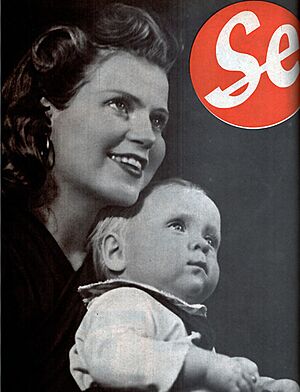Kristina Söderbaum facts for kids
Quick facts for kids
Kristina Söderbaum
|
|
|---|---|

Söderbaum in 1941
|
|
| Born |
Beata Margareta Kristina Söderbaum
5 September 1912 |
| Died | 12 February 2001 (aged 88) Hitzacker, Lower Saxony, Germany
|
| Occupation | Actress |
| Spouse(s) |
Veit Harlan
(m. 1939; died 1964) |
| Children | 2 |
Kristina Söderbaum (born September 5, 1912 – died February 12, 2001) was a famous actress from Sweden. She also worked as a producer and photographer. Kristina Söderbaum became well-known for her roles in German films made during the Nazi era. These movies were produced by a film company controlled by the German government at that time.
Contents
Early Life and Moving to Berlin
Kristina Söderbaum was born in Stockholm, Sweden. Her father, Professor Henrik Gustaf Söderbaum, was an important secretary for the Royal Swedish Academy of Sciences. This academy helps with science in Sweden.
After both her parents passed away, Kristina moved to Berlin, Germany. There, she decided to study acting and joined a theatre school.
Acting Career
Films During the Nazi Era
Kristina Söderbaum started acting in films in 1935. She often worked with a director named Veit Harlan. They got married in 1939. Together, they made ten films for a big German film company called UFA. This company was controlled by the government until 1945.
Many film experts say that Kristina Söderbaum was seen as the perfect example of what the Nazi government wanted women to be like. She was a beautiful blonde from Sweden. Her looks were considered ideal for the "Aryan" woman, a type of person the Nazis promoted. She often played innocent characters in her movies. Her youth and beauty made her a symbol of health and purity. This made her a great example of the Nazi idea of womanhood.
Some of her famous roles from this time include Dorothea Sturm in Jud Süß. This film spread very unfair and harmful ideas about Jewish people. She also played Anna in The Golden City, Elske in The Journey to Tilsit, and Maria in Kolberg.
After World War II
After World War II ended, Kristina Söderbaum faced a lot of criticism. People were very angry about her roles in films that promoted harmful ideas. Sometimes, when she was on stage, people would shout at her. They even threw rotten vegetables.
In later years, she often said she was sorry for being in those films. She regretted her parts in movies that spread unfair messages.
When her husband, Veit Harlan, was allowed to direct films again, Kristina Söderbaum starred in many of them. These movies included Blue Hour (1952) and The Prisoner of the Maharaja (1953). Their last project together was a play called A Dream Play in 1963.
After her husband died in 1964, Kristina Söderbaum became a well-known fashion photographer. In 1974, she acted in a film called Karl May. She also wrote a book about her life in 1983. It was called Nichts bleibt immer so, which means "Nothing Stays That Way Forever."
In her later years, she acted in a few more movies and a TV show called The Bergdoktor. Her very last film was a thriller called Night Train to Venice in 1994. She died in 2001 in a nursing home in Hitzacker, Germany.
Filmography
- The Song to Her (1934)
- Uncle Bräsig (1936)
- Youth (1938)
- Covered Tracks (1938)
- The Immortal Heart (1939)
- The Journey to Tilsit (1939)
- Jud Süß (1940)
- The Great King (1942)
- The Golden City (1942)
- Immensee (1943)
- Opfergang (1944)
- Kolberg (1945)
- Immortal Beloved (1951)
- Hanna Amon (1951)
- The Blue Hour (1953)
- Stars Over Colombo (1953)
- The Prisoner of the Maharaja (1954)
- Verrat an Deutschland (1955)
- Two Hearts in May (1958)
- I'll Carry You in My Arms (1958)
- That Woman (1966)
- Karl May (1974)
- Let's Go Crazy (1988)
- Das bleibt das kommt nie wieder (1992)
- Der Bergdoktor (1993, TV Series)
- Night Train to Venice (1993)

